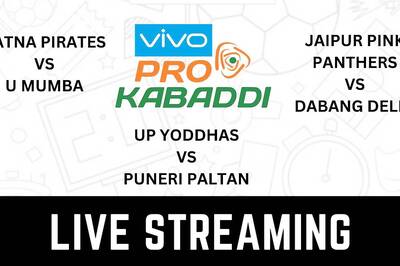
views
Ahead of the Uttar Pradesh Assembly election in 2022, Samajwadi Party, led by Akhilesh Yadav, is stitching alliances with various caste- and community based political parties, such as Apna Dal (Krishna group), Mahan Dal and Suheldev Bharatiya Samaj Party (SBSP).
Why? How is it going to benefit the party in the forthcoming elections?
The Samajwadi Party’s aim is to add a few more aspirant OBC communities to its Muslim-Yadav (M-Y) base vote by forming alliances with small caste- and social community based parties, which are influential in certain regions.
The Suheldev Bharatiya Samaj Party claims to enjoy influence among the Rajbhar caste, which is predominantly located in eastern Uttar Pradesh and constitutes roughly 2 per cent of Uttar Pradesh population. The party can influence electoral performance in around 20 Assembly constituencies of eastern UP.
The Mahan Dal is believed to hold influence among communities like Mauryas and Kushwahas. The Rashtriya Lok Dal (RLD), led by Jayant Chaudhary, has a strong base among Jats in western Uttar Pradesh. Just last week, RLD and Samajwadi Party made a formal announcement regarding their alliance for UP elections.
Similarly, Apna Dal (Krishna group), a faction headed by mother of Anupriya Patel (who is interestingly part of the NDA alliance), is also trying to extend its political base among the Kurmis of Uttar Pradesh.
The Trickle-down Effect
Due to deepening of democracy in post-Independent India, many OBC castes became empowered and cultivated aspirations to get their rightful share in the politics of power, which is considered necessary for distribution of democratic resources in Indian society.
In Indian democracy, it is the trickle-down effect that has enabled many backward castes to receive some democratic benefits which, in turn, has led to heightened political consciousness among them. In states like Uttar Pradesh and Bihar, the democratic benefits first reached numerically dominant communities like Yadavs. Over time, through a trickle-down effect, the benefits reached other socially and numerically important castes like Kurmis, Koris among others.
This slow and steady deepening of political consciousness inspired these communities to get appropriate representation in power corridors—through bigger national political parties, such as the Congress and the BJP. But, as is the nature of politics where any party has to first address its core constituents, members of these smaller communities got disillusioned and felt they were not getting their due. They decided to form their own political parties and exert pressure on bigger national parties for tickets and ministerial berths in lieu of support of their caste/community members.
Samajwadi Party (SP), which itself emerged from a bigger national party, the Janata Dal, claims to represent the largest OBC caste in Uttar Pradesh—Yadavs. From being the ‘smaller’ party providing support to a bigger party, the SP in UP is now seeking support of small but numerically important castes like Kurmis, Mauryas and Kushwahas.
SP is Emulating BJP?
It is interesting to note that it was the BJP which first sensed the growing political aspirations of these non-Yadav OBC castes and has reached out to them since the 2014 elections. It formed alliances with smaller parties like Apna Dal (led by Anupirya Patel) and Om Prakash Rajbhar’s SBSP. These alliances facilitated the movement of a section of non-Yadav OBC communities, such as Kurmis, Nishads and Rajbhars, towards the BJP over the last few years.
The Samajwadi Party, which lost the 2017 Uttar Pradesh elections, seems to have realised its shortcomings. Therefore, the party, which claims to represent OBC political aspirations, is trying to widen its base ahead of 2022 elections, by focusing on non-Yadav communities in the state.
Bharatiya Janata Party (BJP) is also working on electoral strategies and mobilising communities, first by forming alliances with community based parties and second, by approaching communities directly and assuring them representation in democratic politics. Even among these caste-based parties, no one party can claim the support of the entire caste; they exert influence over a section of the caste members.
Success in electoral politics depends on gradual expansion of vote base, and one way of ensuring it is through alliances with social communities and castes. It is achieved by assuring these social communities/castes representation in power politics, which is considered the master key to bring development to those on the margins.
In the run-up to the 2022 UP elections, all big political parties are trying to form social alliances with various castes and communities. Only poll results will determine the success of such alliances.
Badri Narayan is professor and director of GB Pant Social Science Institute, Prayagraj, and the author of ‘Republic of Hindutva’. The views expressed in this article are those of the author and do not represent the stand of this publication.
Read all the Latest Opinions here




















Comments
0 comment